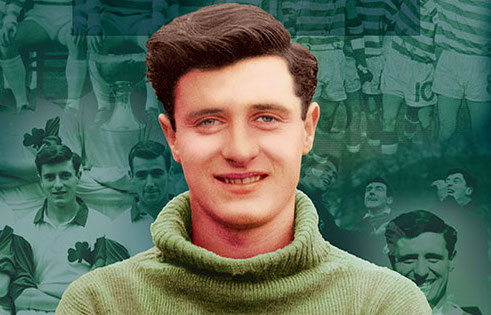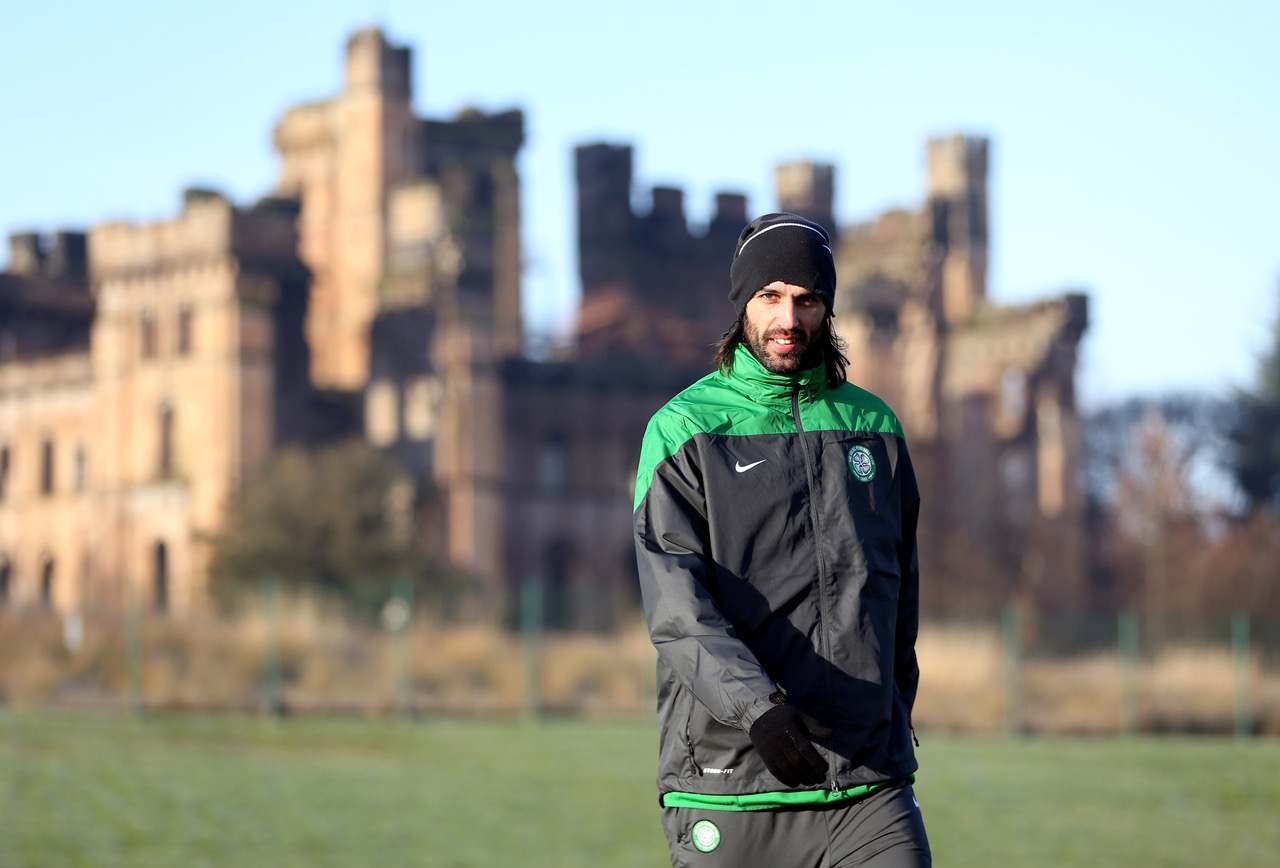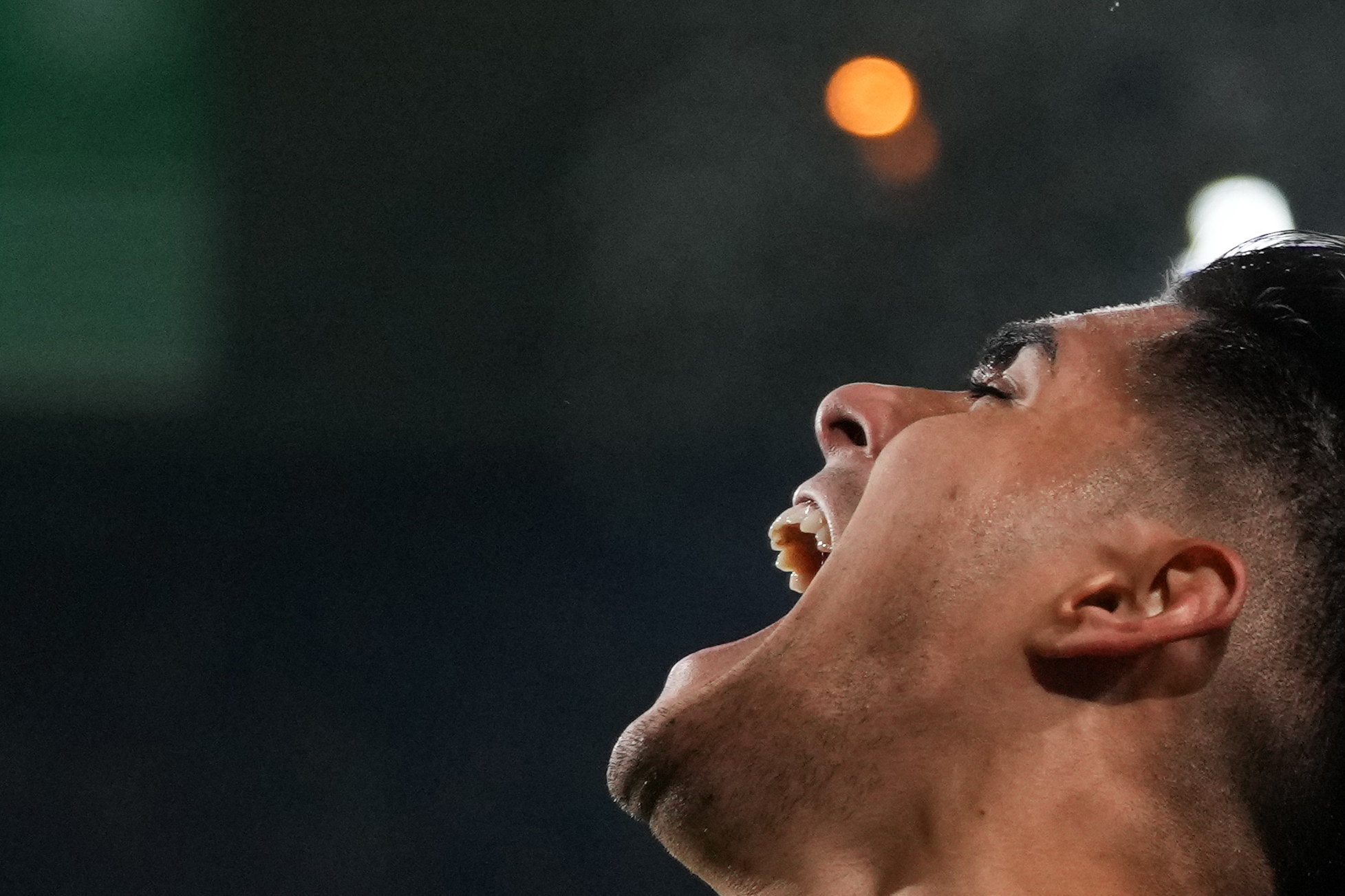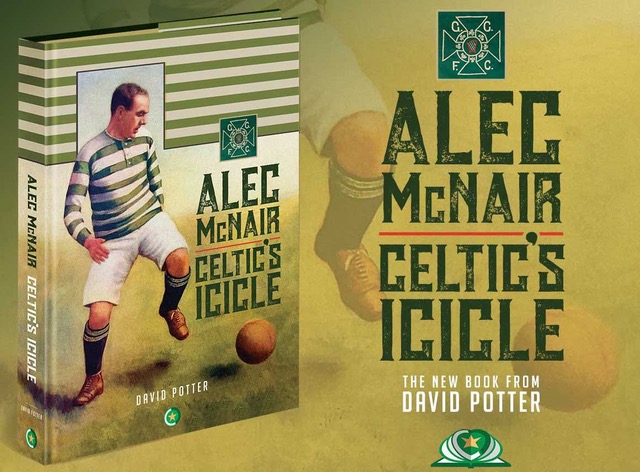The position at the top of the League in mid-March 1968 was that Celtic and Rangers had both played 25 games. Nine games remained. Celtic had by far the better goal average over Rangers, and the way they were playing meant that they were likely to steadily improve it, but the problem still remained the two points. Goal average, we remember, meant dividing the goals for by the goals against, rather than goal difference which is simply the crude method of subtracting goals against from goals for.
Rangers were undefeated in the League, and Celtic needed someone to beat them, or at least two teams to draw with them. And it had to be someone other than Celtic, for the two teams would not meet again this season in the League or indeed any other competition.
Charlie might have been unsettled by the rumours going around at this time that Stein was making a bid to sign Jimmy Smith from Aberdeen. This would have been a direct threat to Charlie’s place in the team, but by the time that Celtic travelled to Brockville on 16 March, nothing had happened. It was claimed that Stein did in fact make an offer to Aberdeen, but it seems to have been a fairly half-hearted one, and it was turned down by Aberdeen, if indeed anything was offered. It is hard to believe that this move would have been a success. Smith was talented, sharing with Jimmy Johnstone the nickname of “Jinky” and was certainly a Celtic sympathiser, but he was a proven discipline problem with both his Manager and with referees.
He had publicly disgraced himself with a dreadful tackle of Stevie Chalmers in last year’s Scottish Cup final – for which he had been booked – and too often found that the Aberdeen fans turned on him for his attitude which did not always appear to be as committed as it should have been.
If Jock had gone for him and failed, he would have consoled himself in that he had Charlie Gallagher who was not only a talented player in the first place, but was also steadily improving with the added responsibility thrust upon him. And there was certainly no problem with his attitude. Indeed, Charlie would prove that Celtic did not need Jimmy Smith. A run in the team was what was needed. This Celtic team was superb – everyone knew that – but that did not mean that it did not require sometime for Gallagher to bed in, as it were, in match conditions. It was one thing on a training ground and quite another in a game in front of ever demanding fans. Bobby Lennox for example was so fast that he preferred the ball a few yards in front of him so that he could run on to it, whereas Johnstone preferred it at his feet, and as long as you managed to get the ball to Wallace or Chalmers in or near the penalty box, there was at least a chance of a goal.
Charlie, never an extrovert in the dressing room, was nevertheless quite assertive on the field and fitted in fairly seamlessly as the team gradually moved into top gear. Much had been made of the psychological aspect of all this, and anyone who ignores this aspect is ignoring the truth. As long as Celtic won their games, Stein and the fans knew that there was at least a chance that Rangers would crack. Rangers knew they had been lucky not to lose to Celtic in the two League games that season – the New Year game in particular – and they probably knew that in their heart of hearts, Celtic were a far superior side.
Rangers had now exited from the Scottish Cup after clearly losing out in the psychological warfare resulting from their Glasgow Cup decision. Their young Manager called Dave White had done a brilliant job for Clyde but was this job too much for him? Clearly out of his depth at this level against Jock Stein, he must have wondered what he was doing. Rangers, in fact, began to look like a man going down a dark alley and expecting to be mugged. Rangers’ adequate but no-more-than-that squad would clearly have doubts as they looked over their shoulders at the approaching Celtic juggernaut, which, for all their failings this season, had, last year, won the European Cup – a fact that everyone reminded Rangers of.
And Celtic were now on a Gallagher-inspired roll, playing superbly and not looking as if they were going to make any errors. Saturday 16 March was one of the worst days, weather-wise, that one could imagine with a howling wind and heavy torrential rain. Celtic were at Falkirk. Brockville, now thankfully closed down, was grossly inadequate at the best of times and out-of-date even in 1968, when it was called “Broken-downville” by visiting supporters.

Falkirk had of course been a graveyard for Celtic in the late 1950s and early 1960s, and they could always be guaranteed to put up a good game against Celtic, whatever their current form was against other teams. This particular day saw the BBC TV crew, there for their highlights programme at night, deciding to abandon their position on top of the enclosure roof! In addition, a piece of roan pipe blew off and hit a poor girl on the head. The exposed terracings were sparsely populated, and those who were there, were clustered under a few umbrellas and hoped in their heart of hearts that referee Mr Anderson of East Kilbride would abandon the game, and allow everyone to go home or to the pub. Indeed, when he extended the half time interval to about 20 minutes to allow the players to change their gear, we suspected that he had done just that!


But a good player in a good team can play in every type of weather, and Charlie rose to the occasion. Celtic led at half-time through a soft penalty as everyone tried to adjust to the conditions, but in the second half, even with large puddles beginning to form on the park, Celtic began to take a grip of the game, adapting their style to a short passing sort of approach, and Wallace and Lennox scored the goals to give Celtic a 3-0 win. The only fly in the ointment was Rangers 5-0 win over Stirling Albion at Ibrox, but Gallagher felt that it was a good day for Celtic the game with a win at a ground which had so often in the past provided a huge hurdle.
Similar weather was in place for the next game, this time a 5-0 beating of lowly Raith Rovers at Parkhead. Ron Trevorrow of The Evening Times says quite unequivocally that “there is no team in the land that could live with these modern day soccer gladiators in green and white”. Willie Wallace scored a hat-trick and Bobby Lennox and John Hughes scored one each. Charlie played superbly that day but was substituted near the end, and we feared that he had picked up some kind of injury, but if it was, it was a very slight one.

More might have been expected of Hibs that day, but they capitulated 1-3 to Rangers which meant that now with only 7 games left, the gap was still that gnawingly annoying two points. But now Celtic seized the initiative. The game v St Johnstone at Perth, originally scheduled for early January but postponed through bad weather, was going to take place on Wednesday night.
Rangers were involved inthe Inter Cities Fairs Cup against Leeds United on the Tuesday, so Stein realised that Celtic could actually be on top of the League if they won at Muirton Park, the then home of St Johnstone. (The Saints moved to McDiarmid Park in 1989). A further opportunity to unsettle Rangers occurred when Willie Ormond, the Manager of St Johnstone, suggested to Celtic that he would rather play the game on the Monday because St Johnstone were in the Scottish Cup semi-final next Saturday against Dunfermline Athletic, and would prefer more time to prepare.
You could almost imagine Stein’s eyes gleaming when he heard this. Not only was there now a chance to be top of the League even BEFORE Rangers took on Leeds United, but Stein also twigged that for a team like St Johnstone, a Scottish Cup semi-final was a huge occasion. They had only been there once before in 1934, and therefore the focus would very definitely be on Saturday’s Scottish Cup semi-final rather than a League game of lesser (for St Johnstone) importance. Opportunity was knocking for Celtic.
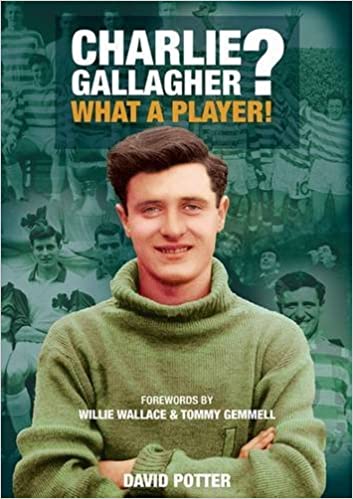
The now recently re-energised Celtic support, there in huge numbers that mild dry spring evening, saw Celtic and Gallagher take command from a very early stage. Lennox scored 4 goals in a 6-1 victory in which Gallagher sprayed passes throughout. Conditions were a lot better than in recent games, and Muirton Park was often reckoned to be the best surface in Scotland for football. This was tailor made for Charlie whose inch perfect passes frequently drew gasps of admiration from the crowd and even the occasional ripple of applause from the traditionally sporting St Johnstone supporters in the main stand.
It was indeed a marvellous exhibition of football, reported in detail in the newspapers, and causing all sorts of distress at Ibrox.Tommy Gemmell tells an interesting story about this game. St Johnstone’s only goal came from a free kick. Stein gave the players a day off training the following day, but after that, pretended to be furious and the next few days at training were spent in doing nothing other than clearing free kicks! This of course is an indirect compliment to Charlie Gallagher and the rest of the team, for he clearly felt that everything else was going well.
Further evidence of the “quivering” of Rangers came when feckless forward play prevented them from scoring at Ibrox against Leeds United, but everyone of the huge Ibrox crowd knew that, given their obsession with Celtic, in their heart of hearts that the problem really was the six goals scored at Perth the previous night! A crack was not far away. Everyone – even sports psychologists – will deny that what happens at a different ground on a different day in a different competition has any effect on another game. But anyone who has ever taken part – even as a spectator – in the claustrophobic atmosphere of the Old Firm will appreciate that there is a great deal in nerve games.
It has happened too often that a triumph in one half of Glasgow will have its effect on the other. Stein certainly realised that. As the spring came (or seemed to), Celtic moved up a gear. 30 March was a big day in the Scottish football programme, for it was Scottish Cup semi-final day. How odd it was to see neither Celtic nor Rangers involved in the Scottish Cup at this stage! But the League programme continued with Celtic and Rangers playing difficult games at Dundee United and Airdrie respectively. The weather clerk seemed to have taken an interest in the destination of the Scottish League and the Scottish Cup. He, apparently, wanted to watch the football as well.
At long last we had a good, sunny day to see Celtic at their best, as they went to Tannadice Park (not always the happiest of hunting grounds in the past) and put five past a Dundee United side which had beaten us twice last year and drawn at Parkhead in December. Once again the forward play was superb and the local Press even went as far as to say that it was the best display of attacking football seen on Tayside for many years.

Dundee United Manager Jerry Kerr was compelled to agree. Indeed, veteran Celtic supporters had never seen anything like it either. Jimmy Johnstone scored a wonderful individual goal to open the scoring, and the biggest surprise of the first half was that Dundee United had survived until half-time having conceded only two goals. It was an absolutely devastating performance, and it was difficult to imagine anyone on earth living with Celtic.

There was a confident jauntiness about the team with Jimmy Johnstone occasionally verging on the unstoppable, Charlie Gallagher spraying passes, Willie Wallace and Bobby Lennox interchanging at speed and John Hughes thundering down the left wing. Not for the first time, did supporters regret that awful game at Celtic Park on 20 September last year which effectively put Celtic out of the European Cup! Interestingly, immediately after the 3rd goal went in, Charlie was taken off and replaced by David Cattenach. It was as if Jock Stein decided that it was “job done” and the time was now ripe to take off the star man and keep him for future occasions.

Gallagher had indeed had a fine game in what was football at its best.He received one of the greatest compliments possible from an elderly fan who, either by a genuine mistake or what was called a Freudian slip, said “Well done, Patsy (sic) Gallagher!” It was one of the best games played by the team in this great epoch. The fans loved it, and the Press and TV reported it all with adulation and jaw-dropping astonishment.
And Rangers quivered even more.They may have quivered, but they still were winning, today getting a late lucky winner to get the better of Airdrie after a poor performance. Both Scottish Cup semi-finals were being played that day as well. Both Dunfermline v St Johnstone and Hearts v Morton ended up in 1-1 draws and were rightly slated as “dreadful” and “boring” in most newspapers. Neither game looked good on the TV highlights, and it was so frustrating to see one’s team playing so well, but, at this stage, looking still as if the Scottish League Cup, won away back in October was all that we were going to have to show for their splendid efforts.
But Celtic’s performance in Dundee did have one side-effect. The local Press now played a part. The Dundee Courier, The Evening Telegraph and even The Sunday Post naturally enough supported the two local teams, but were basically pro-Celtic. (Odd, considering that their politics were blatantly pro-Tory!) Spearheaded by Tommy Gallacher, son of the illustrious Patsy of long ago, a campaign was launched in the knowledge that Dundee United’s next two games were against Rangers – at Tannadice in a postponed game on Wednesday and then at Ibrox on the Saturday.Basically, it admitted that Celtic were good, but also told United that they would have to improve.
Pressure was put on the Dundee United players, and the Wednesday game at Tannadice in particular was pointed to as a game to show their fans that they weren’t as bad as Celtic had made them seem on Saturday. But before that, weather once again played a part. The problem about Scotland’s weather, particularly in the spring was its unpredictability. It had been pleasantly warm on Saturday but now Scotland suffered a rash of snow storms and blizzards – by no means unprecedented in late March or April – and early on Wednesday morning Aberdeen woke up to several inches of snow.
Celtic were due there that night but were alerted and told not to travel. The bad weather however had not reached as far south as Dundee (or Glasgow for that matter) and Rangers’ game at Tannadice was on. So for Charlie and indeed for all the Celtic fans, it was an anxious night waiting for the news from Tannadice. It turned out to be the night in which the first real crack in the Ibrox edifice became visible, because to the delight of their own fans and to those of Celtic, Dundee United stiffened their defence, played the boring defensive football for which they were notorious and earned themselves a goalless draw on a cold, wintry night.
The contrast between Saturday and Wednesday could not have been more acute both in terms of the weather, and in the standard of football. The bad news was that Rangers had now played the same amount of games– there were now only five left – but they were a point ahead. Still, given Celtic’s far superior goal average, one more point lost by Rangers would do it, as long as Celtic didn’t lose any games.
This particular night also saw Dundee, a good team in 1968, reach the semi-final of the Inter Cities Fairs Cup, and Dunfermline and Hearts reach the final of the Scottish Cup. Hearts were thus upbeat for their home game at Tynecastle on Saturday 6 April when Celtic arrived. Hearts had of course been in a fairly obvious decline for a year or two since they threw away the Scottish League in 1965, on the same day as Celtic’s win over Dunfermline in the Scottish Cup final.
In fact, one often felt that 24 April 1965 was the day that symbolised the reversal of roles of the two clubs, for Hearts had prior to 1965 looked like the side that would provide the most consistent challenge to Rangers, while Celtic had been the permanent disappointment, failing on key occasions to believe in themselves.

Now the roles were reversed and it was changed, changed utterly. On this day it was like old times again with a 27,000 crowd at Tynecastle.The Hearts supporters were buoyed to hysterical proportions with their win over Morton in midweek and relishing the prospect of a Hampden Cup final – something that they were not slow to remind us of. In truth it was their first Scottish Cup final for 12 years. But Celtic played things low key, scored two good clinical goals from Johnstone (in which this tiny man out jumped the whole defence to head home) and Lennox and then kept good possession of the ball during a somewhat lethargic second half.
It was in situations like this that Celtic saw the benefit of Charlie Gallagher. Whatever else he could do, he could read a game. He could tell when to slow things down and when to speed things up. He sensed on this occasion that the situation, with Celtic 2-0 up at half-time, needed only sensible possession of the ball against a team which had certainly done well on the Wednesday night but were now suffering from the emotional effects of it all.
In any case, Hearts were not quite as good as some of their more optimistic supporters felt they were. One recalls the scene just as the players came out for the start of the second half with all eyes still glued on the half time scoreboard at the Gorgie Road end of the ground. The Gorgie Road terracing presented the amazing sight of all heads facing away from the field and the Celtic players themselves also facing the board as they waited for the referee to re-start the game.

This was of course the only way in which the score at Ibrox could be conveyed, for there was no radio coverage until 4.10 pm and the BBC could not be guaranteed to give scores of games other than the one they were broadcasting.The scoreboard operators clearly relishing the occasion put up all the other irrelevant scores ignoring the importunate cries of “It’s these bar stewards from Ibrox we want to hear about”, and even, for a laugh, putting up a few fake scores like 5-0 or 0-5. With both teams now back on the field, a“0” at last appeared for the home team at Ibrox, and with everyone now shouting for “3” or “4” to appear for Dundee United, another “0” was put in place. Goalless at half-time!
Still, it was something! It didn’t last, however. Celtic’s good and deserved victory was somewhat tarnished when the radio at 5.00 pm us told the grim news that Dundee United had been unable to repeat their heroics of Wednesday night and had imploded, fairly predictably and depressingly, at Ibrox (as indeed they often did). Rangers had won 4-1 with Alex Ferguson having one of his rare good days in the blue shirt of Rangers. So, four games each to play, and Rangers still one point ahead.
David Potter
To be continued…
